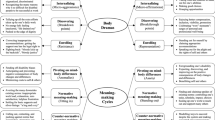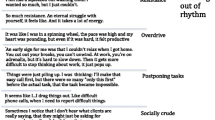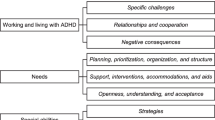Abstract
The purpose of this phenomenological study was to explore people’s experience of reduced working capacity and their encounters with professionals in that life situation. We collected data through in-depth interviews with eight individuals. The main finding of the current research is how illness and accident impairing work capacity exacerbate vulnerability during the recovery process as people experienced uncertainty, depression, anxiety, social isolation, fear and stress. We conclude that counseling and support from respectful, professional, caring and human professionals is extremely valuable in such a context.
Résumé
Vulnérabilité Exacerbée lors de Changements Existentiels: L’Essentiel pour Gérer une Capacité de Travail Réduite. Le but de cette étude phénoménologique était d’explorer le vécu des individus en situation de capacités de travail réduites ainsi que leur rencontre avec des professionnels. Nous avons collecté des données au travers des entretiens approfondis avec huit personnes. Le résultat principal de la présente recherche est que la maladie et les accidents nuisant à la capacité de travail exacerbent la vulnérabilité durant le processus de rétablissement tandis que les individus expérimentent l’incertitude, la dépression, l’anxiété, l’isolation sociale, la peur et le stress. Nous concluons que le conseil et le soutien de la part de spécialistes respectueux, professionnels, aidant, et humains, sont extrêmement important dans un tel contexte.
Zusammenfassung
Erhöhte Vulnerabilität in existentiellen Veränderungen: Die Essenz des Umgangs mit verminderter Arbeitsfähigkeit. Das Ziel dieser phänomenologischen Studie war, die Erfahrung der reduzierten Arbeitsfähigkeit von Menschen und ihrer Begegnungen mit Fachleuten in dieser Lebenssituation zu erkunden. Wir erhobenen Daten von acht Personen anhand von Tiefeninterviews. Das Hauptergebnis der aktuellen Untersuchung war, wie Krankheit und Unfall die Arbeitsfähigkeit einschränkten und während des Erhohlungsprozesses die Vulnerabilität erhöhte als die Personen Unsicherheit, Depression, Angst, soziale Isolation und Stress erlebten. Wir schlossen daraus, dass die Beratung und Unterstützung von respektvollen, professionellen, fürsorglichen, und menschlichen Fachleuten äußerst wertvoll in einem solchen Kontext ist.
Resumen
Vulnerabilidad Exacerbada en los Cambios Existenciales: Cómo se Afronta la Capacidad de Trabajo Reducida. El objetivo de este estudio fenomenológico era explorar la experiencia de las personas con capacidad de trabajo reducida o incapacidad laboral y sus encuentros con profesionales durante esa situación vital. Se recogieron datos a través de entrevistas en profundidad a ocho sujetos. El principal hallazgo de esta investigación fue cómo la enfermedad y los accidentes que reducen la capacidad laboral del sujeto exacerbaron su vulnerabilidad durante el proceso de recuperación, mientras las personas experimentaban incertidumbre, depresión, ansiedad, aislamiento social, miedo y estrés. Concluimos que la orientación personal (counseling) y el apoyo de profesionales competentes, respetuosos, de trato humano y afectivo, es extremadamente valioso en tal contexto.
Similar content being viewed by others
References
Amundson, N. (2003). Active engagement: Enhancing the career counseling process. Richmond, Canada: Ergon.
Amundson, N. (2005). The potential impact of global changes in work for career theory and practice. International Journal for Educational and Vocational Guidance, 5, 91–99. doi:10.1007/s10775-005-8787-0.
Amundson, N., & Borgen, W. (1982). The dynamics of unemployment: Job loss and job search. The Personnel and Guidance Journal, 60, 562–564. doi:10.1002/j.2164-4918.1982.tb00723.x.
Amundson, N., Poehnell, G., & Smithson, S. (1996). Employment counselling, theory and strategies: A book of readings. Richmond, Canada: Ergon.
Blustein, D. L., Kenna, A. C., Gill, N., & DeVoy, J. E. (2008). The psychology of working: A new framework for counseling practice and public policy. The Career Development Quarterly, 56, 294–308. doi:10.1002/j.2161-0045.2008.tb00095.x.
Booth, R. J. (2012). Emotional expression and disclosure. In S. Segerstrom (Ed.), The Oxford handbook of psychoneuroimmunology (pp. 107–128). New York, NY: Oxford University Press.
Breeding, R. R. (2008). Empowerment as a function of contextual self-understanding: The effect of work interest profiling on career decision self-efficacy and work locus of control. Rehabilitation Counseling Bulletin, 51, 96–107. doi:10.1177/0034355207311346.
Brewington, J. O., Nasser-McMillan, S. C., Flowers, C. P., & Furr, S. R. (2004). A preliminary investigation of factors associated with job loss grief. The Career Development Quarterly, 53, 78–83. doi:10.1002/j.2161-0045.2004.tb00657.x.
Brown, M. (2012). Responses to work intensification: Does generation matter? The International Journal of Human Resource Management, 23, 3578–3595. doi:10.1080/09585192.2011.654348.
Brown, A., Bimrose, J., Barnes, S.-A., & Hughes, D. (2012). The role of career adaptabilities for mid-career changers. Journal of Vocational Behavior, 80, 754–761.
Bussolari, C. J., & Goodell, J. A. (2009). Chaos theory as a model for life transitions counseling: Nonlinear dynamics and life’s changes. Journal of Counseling and Development, 87, 98–107. doi:10.1002/j.1556-6678.2009.tb00555.x.
Corbière, M., & Amundson, N. E. (2007). Perceptions of the ways of mattering by people with mental illness. The Career Development Quarterly, 56, 141–149. doi:10.1002/j.2161-0045.2007.tb00026.x.
Corey, G. (2001). Theory and practice of counseling and psychotherapy (6th ed.). Pacific Grove, CA: Brooks/Cole.
Cormier, S., Nurius, P. S., & Osborn, C. J. (2003). Interviewing and change strategies for helpers: Fundamental skills and cognitive behavioral interventions (6th ed.). Belmont, CA: Brooks/Cole.
Dockray, S., & Steptoe, A. (2010). Positive affect and psychobiological processes. Neuroscience and Biobehavioral Reviews, 35, 69–75. doi:10.1016/j.neubiorev.2010.01.006.
Duffy, R. D., & Blustein, D. L. (2005). The relationship between spirituality, religiousness, and career adaptability. Journal of Vocational Behavior, 67, 429–440. doi:10.1016/j.jvb.2004.09.003.
Ebberwein, A. C., Krieshok, S. T., Ulven, C. J., & Prosser, C. E. (2004). Voices in transition: Lessons on career adaptability. The Career Development Quarterly, 52, 292–308. doi:10.1002/j.2161-0045.2004.tb00947.x.
Egan, G. (2009). The skilled helper. A systematic approach to effective helping (9th ed.). Belmont, CA: Brooks/Cole.
Franco, M. (2012). Paradigm shifts and psychoneuroimmunology: Science, health and happiness. The Science in Society Review: The International Journal of Science, Society, and Law, 8. Retrieved from http://bioaccel.org/Volume8.pdf#page=40.
Frey, A., Schober, K., & Hollinger, C. (2014). Editorial. International Journal of Educational and Vocational Guidance, 14, 1–4. doi:10.1007/s10775-014-9263-5.
Glasser, W. (1998). Choice theory: A new psychology of personal freedom. New York, NY: Harper Collins.
Godges, J. J., Anger, M. A., Zimmerman, G., & Delitto, A. (2008). Effects of education on return-to-work status for people with fear avoidance beliefs and acute low back pain. American Physical Therapy Association, 88, 231–239. doi:10.2522/ptj.20050121.
Halldorsdottir, S. (2000). The Vancouver School of doing phenomenology. In B. Fridlund & C. Hildingh (Eds.), Qualitative methods in the service of health (pp. 47–81). Lund: Studentlitteratur.
Hansen, F. T., & Amundson, N. E. (2009). Residing in silence and wonder: Career counselling from the perspective of “being”. International Journal for Educational and Vocational Guidance, 9, 31–43. doi:10.1007/s10775-008-9149-5.
Heinrich, L. M., & Gullone, E. (2006). The clinical significance of loneliness: A literature review. Clinical Psychology Review, 26, 695–718. doi:10.1016/j.cpr.2006.04.002.
Henkelman, J., & Paulson, B. (2006). The client as an expert: Researching hindering experience in counselling. Counselling Psychology Quarterly, 19, 139–150. doi:10.1080/09515070600788303.
Hirschi, A. (2009). Career adaptability development in adolescence: Multiple predictors and effects on sense of power and life satisfaction. Journal of Vocational Behavior, 74, 145–156.
Hjörleifsdóttir, E., Hallberg, I. R., Bolmsjö, I. A., & Gunnarsdóttir, E. D. (2006). Distress and coping in cancer patients: Feasibility and the Icelandic version of BSI and the WOC-CA questionnaires. European Journal of Cancer Care, 15, 80–89. doi:10.1111/j.1365-2354.2005.00620.x.
Horowitz, S. (2009). Effect of positive emotions on health: Hope and humor. Alternative and Complementary Therapies, 15, 196–202. doi:10.1089/act.2009.15706.
International Association for Educational and Vocational Guidance. (1995). IAEVG ethical standards. Retrieved from http://iaevg.net/iaevg.org/IAEVG/nave1ba.html?lang=2&menu=1&submenu=2.
Jacobs, S. J., & Blustein, D. L. (2008). Mindfulness as a coping mechanism for employment uncertainty. The Career Development Quarterly, 57, 174–180. doi:10.1002/j.2161-0045.2008.tb00045.x.
Jinks, H. G. (1999). Intentionality and awareness: A qualitative study of clients’ perceptions of change during longer term counselling. Counselling Psychology Quarterly, 12, 57–71. doi:10.1080/09515079908254078.
Kaplan, P. S. (1990). Educational psychology for tomorrow’s teacher. St. Paul, MN: West.
Koch, L., Egbert, N., Coeling, H., & Ayers, D. (2005). Returning to work after the onset of illness: Experiences of right hemisphere stroke survivors. Rehabilitation Counseling Bulletin, 48, 209–219. doi:10.1177/00343552050480040201.
Krumboltz, J. D., & Henderson, S. J. (2001). A learning theory for the career counselor. In S. G. Niles (Ed.), Adult career development. Concepts issues and practices (3rd ed., pp. 39–56). Alexandria, VA: National Career Development Association.
Kübler-Ross, E. (1969). On death and dying. New York, NY: Macmillan.
Leong, F. T. L., & Walsh, W. B. (2012). Guest editors’ introduction to the special issue. Journal of Vocational Behavior, 80, 659–660. doi:10.1016/j.jvb.2012.03.003.
Lim, R., & Patton, W. (2006). What do career counsellors think their clients expect from their services? Are they right? American Journal of Career Development, 15, 3–41. doi:10.1177/103841620601500207.
Manthei, J. R. (2007). Clients talk about their experience of the process of counselling. Counselling Psychology Quarterly, 20, 1–26. doi:10.1080/09515070701208359.
Marin, B., Prinz, C., & Queisser, M. (Eds.). (2004). Transforming disability welfare policies, towards work and equal opportunities. Surrey, UK: Ashgate.
Masdonati, J., Massoudi, K., & Rossier, J. (2009). Effectiveness of career counseling and the impact of the working alliance. Journal of Career Development, 36, 183–203. doi:10.1177/0894845309340798.
Masdonati, J., Perdrix, S., Massoudi, K., & Rossier, J. (2014). Working alliance as a moderator and a mediator of career counseling effectiveness. Journal of Career Assessment, 22, 3–17. doi:10.1177/1069072713487489.
McMahon, M. (2003). Supervision and career counsellors: A little-explored practice with an uncertain future. British Journal of Guidance & Counselling, 31, 178–187. doi:10.1080/0306988031000102351.
McMahon, M., & Patton, W. (2006). The systems theory framework: A conceptual and practical map for career counselling. In M. McMahon & W. Patton (Eds.), Career counselling: Constructivist approaches (pp. 94–109). London, UK: Routledge.
McMahon, M., & Watson, M. (2012). Story crafting: Strategies for facilitating narrative career counselling. International Journal for Educational and Vocational Guidance, 12, 211–224. doi:10.1007/s10775-012-9228-5.
McMahon, M., Watson, M., Chetty, C., & Hoelson, C. (2012). Examining process constructs of narrative career counselling: An exploratory case study. British Journal of Guidance and Counselling, 40, 127–141. doi:10.1080/03069885.2011.646949.
Müller, W. (2014). Educational inequality and social justice: Challenges for career guidance. International Journal of Educational and Vocational Guidance, 14, 21–33.
Neault, R. A., & Pickerell, D. A. (2011). Career engagement: Bridging career counseling and employment engagement. Journal of Employment Counseling, 48, 185–188. doi:10.1002/j.2161-1920.2011.tb01111.x.
Noddings, N. (2005). The challenge to care in schools. An alternative approach to education (2nd ed.). New York, NY: Teachers College Press.
Organisation for Economic Co-operation and Development. (2007, April). New ways of addressing partial work capacity, OECD thematic review on sickness, disability and work issues paper and progress report. Retrieved from http://www.oecd.org/els/soc/38509814.pdf.
Patton, W., & McMahon, M. (2006). Constructivism: What does it mean for career counselling? In M. McMahon & W. Patton (Eds.), Career counselling: Constructivist approaches (pp. 3–15). New York, NY: Routledge.
Plant, P., & Turner, B. (2005). Getting closer: Workplace guidance for lifelong learning. International Journal of Lifelong Education, 24, 123–135. doi:10.1080/02601370500056243.
Repetto, E., Ferrer-Sama, P., & Manzano, N. (2008). Setting the scene: Competencies for training counsellor practitioners. International Journal of Educational and Vocational Guidance, 8, 145–153. doi:10.1007/s10775-008-9144-x.
Ribner, D. S., & Knei-Paz, C. (2002). Client’s view of successful helping relationship. Social Work, 47, 379–387. doi:10.1093/sw/47.4.379.
Ricoeur, P. (1980). Existence and hermeneutics (K. McLaughlin, Trans.). In J. Bleicher (Ed.), Contemporary hermeneutics: Hermeneutics as method, philosophy and critique (pp. 236–256). London, UK: Routledge & Kegan Paul.
Ricoeur, P. (1990). Hermeneutics and the human sciences: Essays on language, action and interpretation (J. B. Thompson, Ed., Trans.). Cambridge, UK: Cambridge University Press.
Rogers, C. (1969). Towards a science of the person. In A. J. Sutich & M. A. Vich (Eds.), Readings in humanistic psychology (pp. 21–50). New York, NY: Free Press.
Savickas, M. L. (1997). Constructivist career counseling: Models and methods. In R. Neimeyer & G. Neimeyer (Eds.), Advances in personal construct psychology (Vol. 4, pp. 149–182). Greenwich, CT: JAI Press.
Savickas, M. L. (2000). Renovating the psychology of career for the twenty-first century. In A. Collin & R. Young (Eds.), The future of career (pp. 53–68). Cambridge, UK: Cambridge University Press.
Savickas, M. L. (2005). The theory and practice of career construction. In S. D. Brown & R. W. Lent (Eds.), Career development and counseling: Putting theory and research to work (pp. 42–70). Hoboken, NJ: Wiley.
Schwandt, T. A. (1994). Constructivist, interpretivist approaches to human inquiry. In N. K. Denzin & Y. Lincoln (Eds.), Handbook of qualitative research (pp. 118–137). Thousand Oaks, CA: Sage.
Sharf, R. S. (2002). Applying career development theory to counseling. Pacific Grove, CA: Brooks/Cole.
Sigurgeirsdottir, J., & Halldorsdottir, S. (2007). Existential struggling and self-reported needs of patients in rehabilitation: A phenomenological study. Journal of Advanced Nursing, 61, 384–392. doi:10.1111/j.1365-2648.2007.04531.x.
Skuladottir, H., & Halldorsdottir, S. (2011). The quest for well-being: Self-identified needs of women in chronic pain. Scandinavian Journal of Caring Sciences, 25, 81–91. doi:10.1111/j.1471-6712.2010.00793.x.
Smithson, W. H., Hukins, D., & Jones, L. (2006). How general practice can help improve care of people with neurological conditions: A qualitative study. Primary Health Care Research and Development, 7, 201–210. doi:10.1191/1463423606pc291oa.
Spiegelberg, H. (1984). The phenomenological movement: A historical introduction by Herbert Spiegelberg (3rd ed.). The Hague, The Netherlands: Marinus Hijhoff.
Stead, G. B., Perry, J. C., Munka, L. M., Bonnett, H. R., Shiban, A. P., & Care, E. (2012). Qualitative research in career development: Content analysis from 1990 to 2009. International Journal for Educational and Vocational Guidance, 12, 105–122. doi:10.1007/s10775-011-9196.
Sultana, R. G. (2009). Competence and competence frameworks in career guidance: Complex and contested concepts. International Journal for Educational and Vocational Guidance, 9, 15–30. doi:10.1007/s10775-008-9148-6.
Super, D. E., & Knasel, E. G. (1981). Career development in adulthood: Some theoretical problems and possible solution. British Journal of Guidance and Counselling, 9, 194–201. doi:10.1080/03069888108258214.
Uchino, B. N., Vaughn, A. A., Carlisle, M., & Birmingham, W. (2012). Social support and immunity. In S. Segerstrom (Ed.), The Oxford handbook of psychoneuroimmunology (pp. 214–233). New York, NY: Oxford University Pres.
Umberson, D., & Montez, J. K. (2010). Social relationships and health: A flashpoint for health policy. Journal of Health and Social Behavior, 51(S), S54–S66. doi:10.1177/0022146510383501.
United Nations. (2006). Convention on the rights of persons with disabilities. New York: Department of Public Information. Retrieved from http://www.un.org/disabilities/convention/conventionfull.shtml.
Vilhjálmsdóttir, G. (2008). Career guidance and habitus—The value of Bourdieu’s concept of habitus in career guidance research and practice. Career Research and Development, 19, 4–11.
Vilhjálmsdóttir, G., & Arnkelsson, G. (2003). The interplay between habitus, social variables and occupational preferences. International Journal for Educational and Vocational Guidance, 3, 137–150. doi:10.1023/A:1024760107769.
Wald, J., & Alvaro, R. (2004). Psychological factors in work-related amputation: Considerations for rehabilitation counselors. Journal of Rehabilitation, 70, 6–15.
Watson, M. B. (2006). Career counselling theory, culture and constructivism. In M. McMahon & W. Patton (Eds.), Career counselling: Constructivist approaches (pp. 45–56). New York, NY: Routledge.
Zacher, H. (2014). Individual difference predictors of change in career adaptability over time. Journal of Vocational Behavior, 84, 188–198. doi:10.1016/j.jvb.2014.01.001.
Author information
Authors and Affiliations
Corresponding author
Rights and permissions
About this article
Cite this article
Steingrímsdóttir, S.H., Halldórsdóttir, S. Exacerbated vulnerability in existential changes: the essence of dealing with reduced working capacity. Int J Educ Vocat Guidance 16, 251–274 (2016). https://doi.org/10.1007/s10775-015-9297-3
Received:
Accepted:
Published:
Issue Date:
DOI: https://doi.org/10.1007/s10775-015-9297-3




